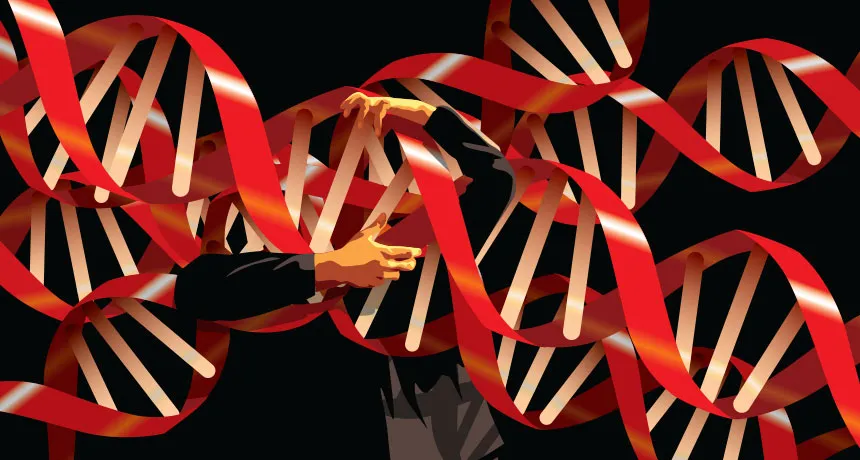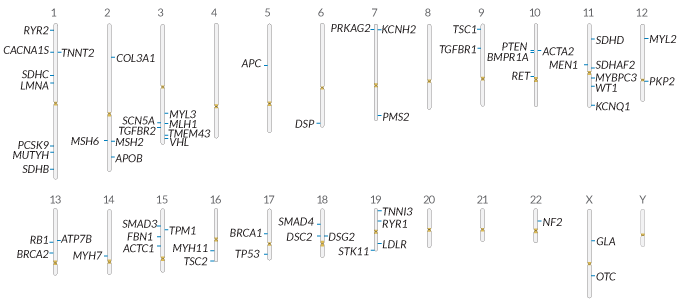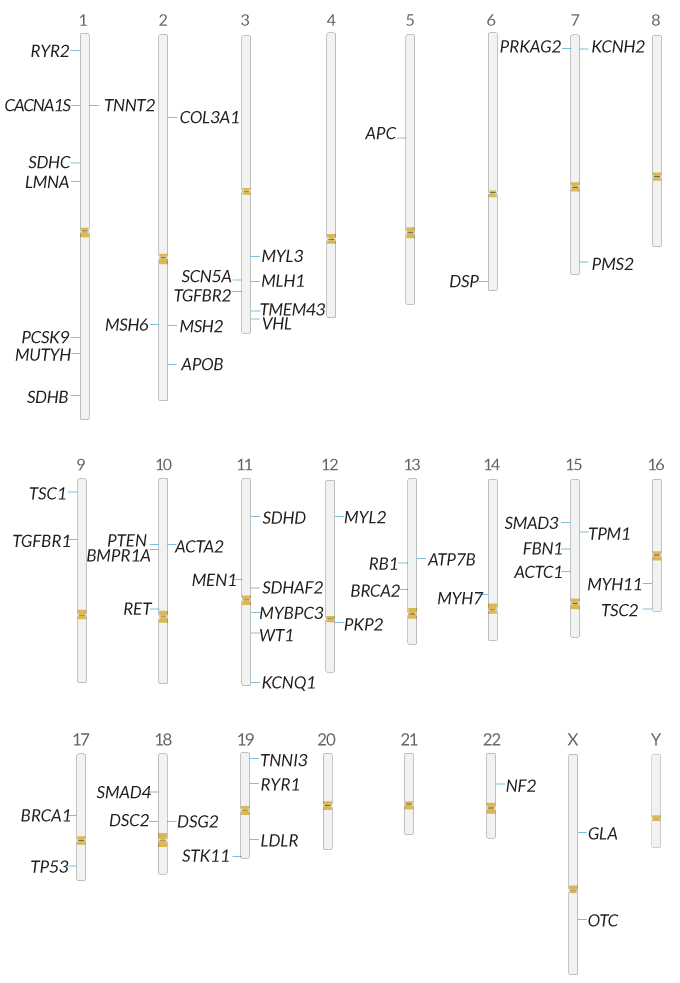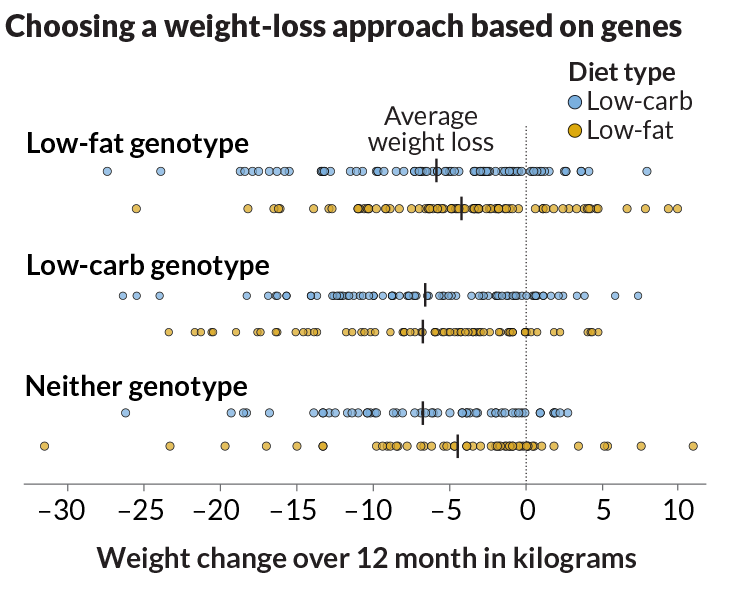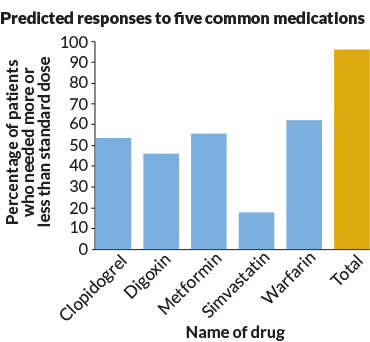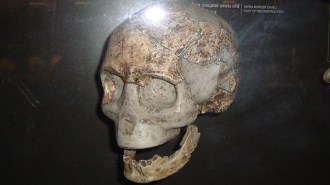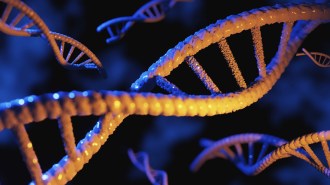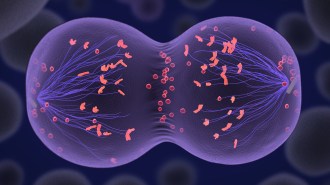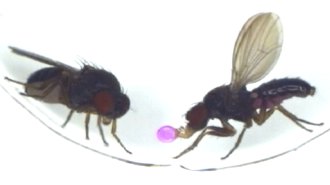Consumer DNA testing promises more than it delivers
Here’s what to expect from consumer DNA tests

AN OPEN BOOK Science News reporter Tina Hesman Saey had a lot of info to make sense of after getting her DNA tested by eight different companies.
Matthew Rakola
In Nevada, 40,000 people are stepping up to the cutting edge of precision medicine. They are getting their DNA deciphered by the testing company Helix. The idea of the Healthy Nevada project is to link genetic and medical data with information about the environment to get a clearer picture of all the factors that influence health. The free tests are going like hot cakes.
When the Healthy Nevada project launched a similar partnership with 23andMe in 2016, 5,000 residents were offered a free testing kit in exchange for participation in the program.
“Within 24 hours, 5,000 people had broken our website and signed up really enthusiastically,” says project head Joseph Grzymski, a computational biologist at the Desert Research Institute’s Reno campus. Another 5,000 kits were offered up. “Within 24 hours that sold out,” Grzymski says, “and we had 4,000 people on a waiting list.”
Even without an invitation or a free deal, consumers are flocking to these tests. Last year, more than 7 million people, mostly in the United States, sent their DNA to testing companies, according to industry estimates.
“DNA testing is no longer a niche interest, it’s a mass consumer market, with millions of people wanting to experience the emotionally powerful, life-affirming discoveries that can come from simply spitting in a tube,” Howard Hochhauser, interim chief executive of the online geneaology testing company Ancestry, said in a public statement about the company’s 2017 holiday sales.
I am one of those 7 million who wanted a read on my DNA, to learn about myself and my heritage. And I went all out. My DNA is now part of the data banks of consumer genetic testing companies Ancestry, 23andMe, Family Tree DNA, Gencove, Genos, Helix, Living DNA and Veritas Genetics. (For a review of my experiences, click here). I learned some things about myself — and about the glaring limits of today’s consumer genetic tests.
Broad business
Companies claim that they can read nearly everything about a person in his or her DNA profile. Some firms use DNA details to trace family trees or offer dietary advice and training regimens for burning fat or building muscle. Others go further out on a limb, claiming that testing a handful of genes can reveal a child’s future potential.
Need help choosing a wine? A test of variants in a few genes associated with taste and smell — along with a quick quiz — offers options that one company says will please your palate. There are even kits that claim to reveal superhero abilities, or that let two friends virtually mash up their DNA to see what their offspring might look like.
While some applications are clearly frivolous or pure entertainment, others are serious medical business. Consumers can buy tests that screen for gene variants that increase risk for developing cancer, high cholesterol, diabetes, Alzheimer’s disease or Parkinson’s. Human Longevity, in San Diego, pairs a readout of a person’s whole genome with extensive body imaging, blood tests and other medical screening to gauge a client’s health with the goal of increasing life span. Scientists say it’s probably going to take this sort of comprehensive information to really personalize medicine, but few people can afford Human Longevity’s $25,000 price tag.
These companies are part of a growing trend often called personalized, or precision, medicine. Health care systems, including national systems in Estonia, Finland, England and elsewhere, are adding DNA data to medical records, hoping to better tailor treatments to individual patients or even prevent illness. Consumer testing companies draw on databases compiled from such publicly funded research resources to make predictions about a customer’s health.
Some testing companies share their data with researchers who study human health and genetics, some do their own studies and some use the data as a revenue source, selling it to pharmaceutical companies. I opted to allow the companies to share my data with researchers. You don’t have to choose that option, but I like the idea of contributing to science.
And more research is needed. Scientists still haven’t really learned how to interpret the story in a person’s genetic instruction book, or genome, and apply it to an individual’s health care. Every researcher I talked to says that goal is far in the future.
“There will be a time when many more common health conditions will have tests you can do that will really inform you,” says Bryce Mendelsohn, a medical geneticist at the University of California, San Francisco. “But it will be years, years, decades before we’re really at that stage.”
In August, Mendelsohn opened the Preventive Genomics Clinic at UCSF’s Benioff Children’s Hospital. There, he counsels adults on what type of genetic testing is right for them, and what to expect from the results. He’s not against consumer genetic testing, but he tells his patients that it’s for entertainment purposes only.
“If they say, ‘I want to know about my ancestry. I want to know how much Neandertal I have,’ I say, ‘Great, that’s what consumer genetic testing is for.’ ”
But for medically relevant information — such as genetic variants that increase risk for cancer, high cholesterol or heart problems — Mendelsohn orders tests from labs that are certified to make thorough clinical diagnoses. And he makes sure his patients know what to expect and what their results mean.
“It’s not that companies that are selling tests are somehow evil,” Mendelsohn says; they just promise too much. “I just tell people up front, if you’re going to get this test, the odds are that you’re going to come back with nothing.”
False security
Daniel Cressman, a commercial real estate broker in San Francisco, wasn’t expecting to get any troubling or surprising results when he decided to have his DNA deciphered. He did it “just out of curiosity” after attending a conference on future trends. He wanted to be on the leading edge of what he sees as the wave of the future. One day soon, he predicts, “You’ll go to the doctor and the first thing they’ll do is pull up your genome.”
After hearing about the different levels of genetic testing that are offered (see “How much gets tested?”), Cressman decided he wanted the thorough approach: whole genome sequencing. To have his full genetic instruction book deciphered, rather than only certain parts, he looked into various companies’ offerings and ultimately settled on Veritas Genetics. The company will sequence a person’s genome for $999. Other companies offer whole genome sequencing, too, but for a higher price tag, anywhere from $1,295 for genealogy purposes to health testing ranging from $2,500 to more than $25,000.
Some of Cressman’s family and friends are not on board with genetic testing, he says. “Some people ask, ‘What if you discover something you don’t want to know?’ ” But Cressman thinks it’s usually better to know what’s potentially in store. “If I’m flying San Francisco to New York on an Airbus and there’s a crack in the wing, I’d kind of like to know before I get on the plane.” He didn’t discover any cracks in his genes that would cause him or his doctor concern. “Nothing popped out at all,” he says.
Like Cressman’s, my DNA’s story, based on Veritas’ whole genome sequencing, turned out to be pretty boring. For both of us, testing didn’t turn up any variations embedded in our DNA that are likely to cause us to develop a genetic disease. That’s good news, says clinical medical geneticist Gail Jarvik. “We tell people, ‘If you’re lucky, you have a boring genome. That’s what you really want.’ ”
But just because Veritas didn’t find anything scary in our genomes, doesn’t mean Cressman and I won’t develop health problems. Getting a clean bill of health based on your genes “can be very misleading and falsely reassuring,” says Jarvik, who heads the division of medical genetics at the University of Washington in Seattle. It can also be a bit of a letdown for people who expect revelations.
I admit to wanting more. Maybe I should have known better, but I thought I’d find out about all the ways I differ from other people, those genetic quirks that make me, me. I was most excited to learn about one weird thing: why my face flushes flaming red and I itch all over when I have even a few sips of alcohol. The companies advertised that they could reveal the genetic reason behind the annoying reaction. When the results came back, I was baffled. 23andMe and Veritas both said that I am unlikely to flush when I take a drink.
But those companies based their erroneous assertion on a variant known to be associated with alcohol-flushing in East Asians. My background is European, so it’s unlikely that I would have that variant in the first place. I might have a different variant in that same gene or in some other gene related to how my body processes alcohol. Neither company reports on the other genes. So maybe I was expecting too much. But maybe that’s not entirely my fault.
“I think [consumers are] being overpromised that getting the genome sequenced will tell them lots of things that it won’t,” Jarvik says. “I’ve definitely run across people who have … been very disappointed because they didn’t learn as much as they thought.”
No drama
Most healthy people who send off their cheek swabs or saliva samples for DNA testing should expect to have a boring genome, says Leslie Biesecker, a molecular and clinical geneticist at the National Institutes of Health in Bethesda, Md. At this stage of the science, genome sequencing is not very useful for most people, he says.
DNA sequencing does play a role in diagnosing mysterious inherited diseases and for detecting the mutations that lead to cancer, Biesecker says. But he’s dubious of the value for healthy people. “If you don’t have such a condition, there’s a much lower chance of finding something that would be useful to you medically.”
Only a very few people may have a rare genetic disorder and not know it, Biesecker says. “Occasionally we pick up some really severe stuff — hearing loss, cancer susceptibility or severe heart conditions — that you do need to do something about,” he says. “We’ve had several people with a pretty high susceptibility to colon cancer, and we know it will add 10 to 20 years to their life expectancy if they get annual colonoscopies. So for those people, it’s clear, it’s dramatic and it’s useful.” But such powerful results are the exception.
Roughly 3 percent of healthy people have known disease-causing variants in one or more of 59 genes on a list compiled by the American College of Medical Genetics and Genomics, according to a 2015 report in Genetics in Medicine. Variants in those genes are considered “medically actionable.” In other words, the genetic variants could cause problems for which medications, screening or other steps can be taken to ease or head off symptoms and serious consequences.
To get results on most of those medically important variants, according to U.S. Food and Drug Administration rules, a person needs a doctor to sign off, which is why Veritas requires a doctor’s order before it will analyze a DNA sample.
Last year, the FDA opened the door a crack for one direct-to-consumer company, 23andMe, to offer customers information about diseases related to particular changes in individual genes — no prescription or referral needed. For example, the company can now tell customers whether they have one of three variants in the BRCA1 and BRCA2 genes that raise the risk of breast cancer. (There are thousands of variants in those genes linked to breast cancer, but the company is allowed to report on only three.)
Customers who want to know can also find out if they have a variant of the APOE gene linked to a higher chance of getting Alzheimer’s disease, or variants in the LRRK2 and GBA genes associated with Parkinson’s disease. The company can also tell you about genetic variants that increase the risk of the eye disease macular degeneration, as well as celiac disease and some other health conditions with well-established genetic connections. All without a referral or prescription.
Carried away
People inherit two copies of most genes — one from mom, one from dad. Many of the variants on the list of 59 genes cause trouble when just a single copy is inherited from one parent. Geneticists refer to such genetic variants as “dominant.”
Some dominant variants lead to rare conditions, including changes in the BRCA1 and BRCA2 genes that can cause breast and ovarian cancers, a variant of the PCSK9 gene that causes high cholesterol and changes in multiple genes that increase colon cancer risk. Some genetic variants linked to certain heart problems, neurological disorders and other serious health issues are also on the list.
Most people, including me, probably don’t have defects in single genes that could bring on a health crisis. What we pass on to our children, though, is another matter. Many people carry one copy of a disease-causing mutation, which isn’t enough to cause trouble for them, but they could pass it on to their children. A child who inherits disease-causing versions of the same gene from both parents could be very sick. That’s the case for conditions such as cystic fibrosis, phenylketonuria, Tay-Sachs and many other “recessive” genetic diseases.
23andMe, Veritas and other direct-to-consumer genetic testing companies can now give information about a person’s “carrier status,” identifying whether you have one copy of a recessive disease variant that your kids could inherit.
Preliminary studies suggest that, on average, most people are carriers for two recessive genetic diseases — some carry no such variants, others have up to seven or eight. I’m average. I carry two, or three, depending on the company doing the test; I didn’t get the same results from every company.
Being a carrier for a life-threatening genetic disease could influence a person’s decisions about having children. When both members of a couple carry disease-causing variants in the same gene, the couple has a 25 percent chance of having an affected child. Some couples might risk it; others might forgo having children. Some may try to improve their odds of having a healthy baby by seeking help from fertility clinics, where doctors can perform in vitro fertilization and then screen out embryos that have inherited two copies of the disease-causing variant (SN: 12/23/17, p. 21).
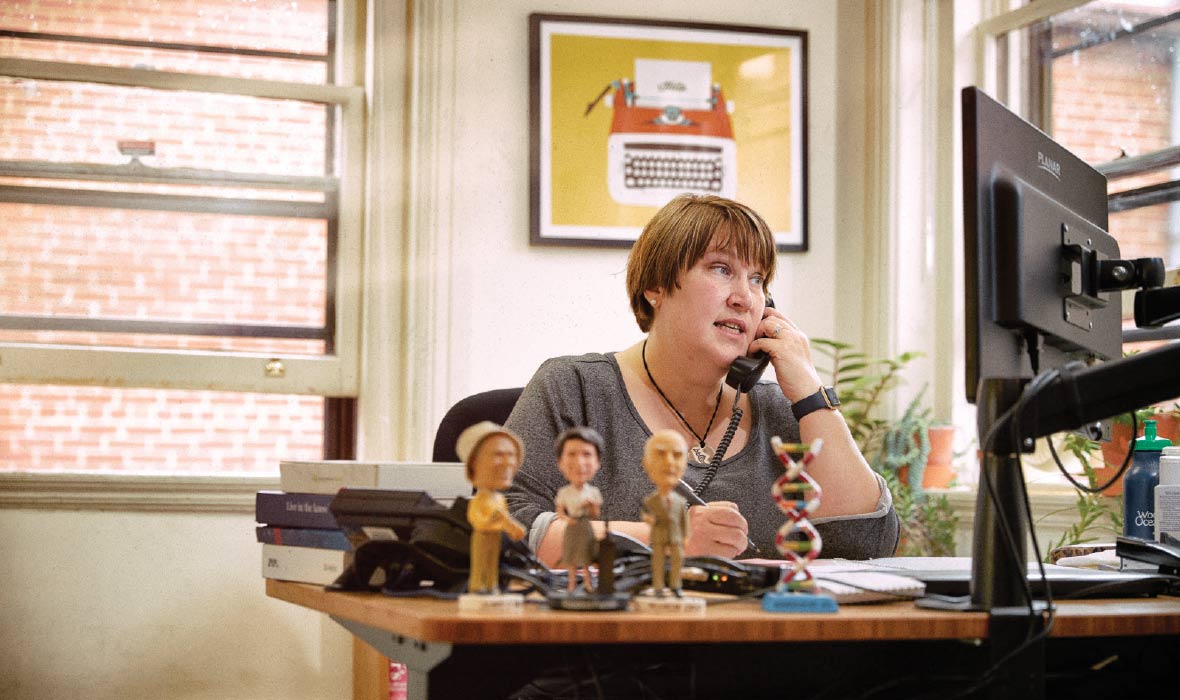
Reality check
Unlike the rare single-gene diseases, the vast majority of common traits, diseases and conditions are the product of tweaks in many genes working together. Such conditions are called polygenic traits. Researchers aren’t yet very good at figuring out how all the subtle tweaks in the genome, called single nucleotide polymorphisms, or SNPs, come together to affect appearance, behavior and health.
Take type 2 diabetes, for instance. Hundreds of gene variants have been linked to the disease, but none is the single factor that ensures a person will develop the disorder. Most SNPs have only a tiny influence on the chance a person will get a disease — lifestyle and environment play a role, too.
And what should a person do about a variant that nudges up diabetes risk? Biesecker told me how it might play out. “If I do have that variant, I can go to my doctor [who] will tell me I can improve my health by improving my diet and exercising,” he says. “If I don’t have that variant, I can go to my doctor and my doctor will say, ‘You can improve your health and longevity by improving your diet and exercising.’ ” If you get the same advice either way, there’s little value in knowing whether you have the variant or not, he says.
Companies such as 23andMe used to tell consumers their risk of developing polygenic diseases. No more. In 2013, the FDA banned the company from giving customers in the United States that information. Right now, Veritas, which is certified to give clinical information, doesn’t report risk of diseases that are influenced by multiple genes. It and other companies are allowed to tell customers about polygenic traits that aren’t disease-related, such as hair and eye color or attached or detached earlobes. 23andMe examines 32 variants to weigh in on whether your earlobes hang free or cling to the side of your head. And as many as 49 different spots in the genome could be involved in earlobe shape, a study published last year in the American Journal of Human Genetics suggests. That study included data collected from 23andMe customers. This kind of information lands on the fun-but-frivolous end of the information spectrum. But it’s kind of cool to learn the genetics behind your ear shape.
Plenty of companies claim they can read your genes to tell you what you should eat or how you should exercise. Basing your diet on science seems like the smart thing to do. But Christopher Gardner, director of nutrition studies at Stanford University’s Prevention Research Center, says no. “Not today.”
Gardner should know. He and colleagues tested whether variants in three genes involved in fat or carbohydrate metabolism could predict whether a person would be more successful at losing weight on a low-fat or a low-carb diet. The idea was based on his team’s previous study of 130 people. Those whose genetic profile matched the diet they were assigned to lost three times as much weight as those whose diets and genetics didn’t match.
“It was plausible,” Gardner says. So the team expanded the study to more than 600 overweight and obese people, assigning each person at random to either a low-fat or low-carb diet. After one year, the researchers looked at weight loss among participants: Did a diet based on an individual’s genetics make a difference?
“The punch line is really short,” Gardner says. “It didn’t work.” On average, participants in both diet groups lost about five or six kilograms (12 to 13 pounds) over 12 months. Some lost much more, some less and some gained weight. But there was no connection between successful weight loss and whether the participants’ diet and gene profiles matched, Gardner and colleagues reported in the Feb. 20 JAMA.
I pointed out that consumer genetic companies usually include the variants Gardner and colleagues tested, plus four or five other variants related to body mass index, having a sweet tooth and sensitivity to insulin, the hormone that regulates blood sugar. Would that be better?
“No,” Gardner says. “You can make a plausible claim, but then you have to test it.”
Obesity is a complex trait. Studies have linked more than 200 variants to body weight, but none tell the whole story of why people’s weight varies so much. “It isn’t that there’s one answer and in 10 years [we’ll have it],” Gardner says. “The answers will get progressively clearer and clearer. We could have a couple next year. They just won’t be the end-all, be-all answers.”
Drug reactions
If genetic testing can’t tell you much about health, diet and exercise, what is it good for? Even the most skeptical researchers I talked with said that one area holds promise: pharmacogenetics, or how variants in DNA affect how people will react to certain drugs.
David Bick, a clinical geneticist at the HudsonAlpha Institute for Biotechnology in Huntsville, Ala., has sequenced 45 people’s genomes as part of a new program. The mostly white, highly educated, middle-aged participants, ranging in age from 31 to 89, paid about $7,000 for thorough physical exams along with DNA sequencing and analysis. HudsonAlpha collaborates with Huntsville-based Kailos Genetics to give participants pharmacogenetic rundowns. These drug reaction profiles will be invaluable for future reference, Bick says.
For example, doctors often prescribe a drug called clopidogrel, brand name Plavix, to people who have survived a heart attack. The drug keeps blood clots from forming, reducing the risk of another heart attack. In the body, the drug has to be converted to an active form by several enzymes, including CYP2C19. “If you have a change in that CYP2C19 gene, you can’t convert [Plavix] to the active form,” Bick says. If you have a heart attack and your doctor knows you have the variant, you could get a different medication that works for you, he explains.
We all have about an 80 percent chance of having at least one genetic variant in one of 806 genes that could alter the way one of the top 100 prescribed drugs in the United States works, researchers reported December 22 in Genome Medicine.
Based on my Veritas report, the only one that gave this information, I have at least 48 variants that can influence my reaction to dozens of drugs, all but one of which I don’t take. So the information isn’t that useful right now, but it may be useful in the future.
Maybe it isn’t so helpful today, but don’t dismiss genetic testing out of hand, says Robert Green, a geneticist who has been studying people’s responses to genetic information for more than two decades. Green, of Brigham and Women’s Hospital in Boston, thinks scientists will soon have a better handle on genetic information. “What we see today is not the endgame. It’s not even the second inning.”
